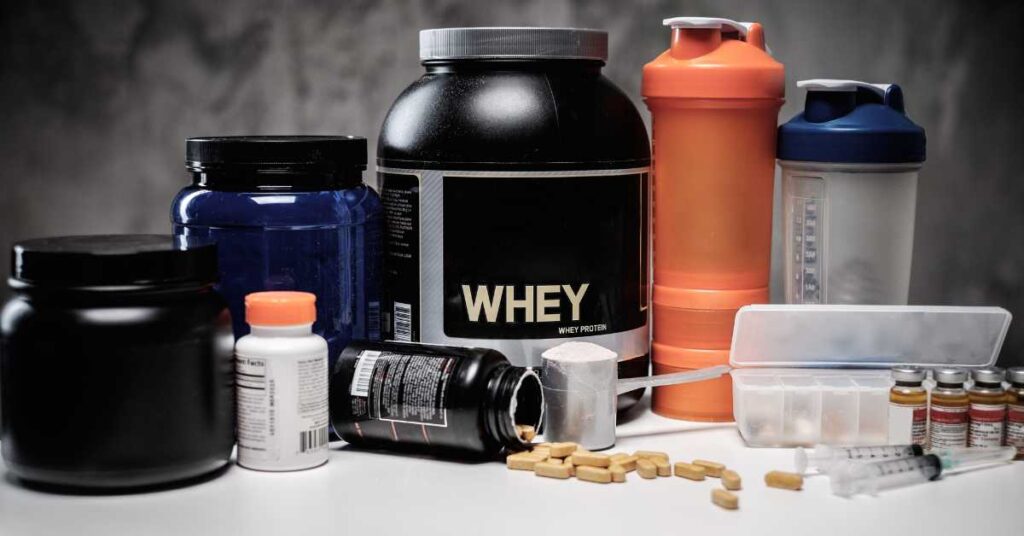Introduction
Supplements play a significant role in supporting athletic performance and overall well-being. As an athlete, you may be familiar with the numerous options available on the market, each claiming to enhance your performance and accelerate your progress. In this comprehensive guide, we will navigate the world of supplements for athletic performance, exploring the essential ones that can truly make a difference.
From pre-workout fuel to post-workout recovery, joint support to immune-boosting, and mental focus to sports-specific enhancements, we will cover a wide range of supplements to help you optimize your athletic performance.
Understanding Nutritional Needs for Athletes
Macronutrients: The Foundation of Athletic Nutrition
Before delving into supplements, it’s crucial to establish a solid foundation of proper nutrition. We explore the importance of macronutrients such as carbohydrates, proteins, and fats in fueling athletic performance and discuss their specific roles in energy production, muscle repair, and overall recovery.
Micronutrients: Enhancing Performance and Recovery
In addition to macronutrients, micronutrients play a crucial role in supporting athletic performance. We shed light on vitamins, minerals, and antioxidants that are essential for energy metabolism, immune function, and fighting oxidative stress. Understanding the significance of these micronutrients can guide your supplement choices.
Pre-Workout Supplements: Fueling Your Performance
Creatine: Boosting Strength and Power
Creatine has long been hailed as a staple supplement for athletes. We dive into the science behind creatine, explaining how it enhances strength, power, and high-intensity performance. Discover the proper dosage and timing for optimal results.
Beta-Alanine: Enhancing Endurance and Delaying Fatigue
Endurance athletes can benefit from beta-alanine supplementation. We explore how this amino acid works to reduce fatigue, increase muscle endurance, and improve performance in activities that require sustained efforts. Learn how to incorporate beta-alanine effectively into your routine.
Caffeine: Increasing Energy and Focus
Caffeine is a popular pre-workout supplement known for its stimulating effects. We uncover how caffeine can boost energy, enhance focus, and improve exercise performance. Explore the appropriate dosage and timing strategies to maximize the benefits of caffeine.
Post-Workout Supplements: Optimizing Recovery
Whey Protein: Promoting Muscle Repair and Growth
Whey protein is a go-to supplement for post-workout recovery. We explore its role in muscle repair, protein synthesis, and muscle growth. Discover the best practices for consuming whey protein to optimize your recovery process.
Branched-Chain Amino Acids (BCAAs): Reducing Muscle Soreness and Enhancing Recovery
BCAAs have gained popularity for their potential to reduce muscle soreness and enhance recovery. We delve into the science behind BCAAs and their benefits for muscle repair, fatigue reduction, and preserving lean muscle mass. Learn how to incorporate BCAAs into your post-workout routine effectively.
Tart Cherry Juice: Easing Muscle Inflammation and Enhancing Sleep
Tart cherry juice is a natural supplement known for its anti-inflammatory properties and potential to enhance sleep quality. We discuss its role in reducing muscle inflammation, speeding up recovery, and promoting restful sleep. Discover the optimal timing and dosage for tart cherry juice consumption.
Supplements for Joint Health and Injury Prevention
Glucosamine and Chondroitin: Supporting Joint Health and Function
Joint health is vital for athletes, and glucosamine and chondroitin are often recommended supplements. We explore how these compounds support joint health, reduce inflammation, and alleviate pain. Find out if glucosamine and chondroitin are right for you.
Omega-3 Fatty Acids: Reducing Inflammation and Supporting Connective Tissues
Omega-3 fatty acids have numerous benefits for athletes, including reducing inflammation and supporting healthy connective tissues. We discuss the different sources of omega-3s, their role in injury prevention, and their impact on overall performance.
Collagen: Promoting Joint and Tendon Health
Collagen supplementation has gained popularity for its potential to support joint and tendon health. We uncover the science behind collagen, its role in maintaining healthy connective tissues, and its impact on athletic performance. Discover the best practices for collagen supplementation.
Immune-Boosting Supplements for Athletes
Vitamin C: Strengthening the Immune System
A strong immune system is crucial for athletes, and vitamin C plays a vital role in immune function. We discuss the benefits of vitamin C, its antioxidant properties, and its impact on reducing the risk of illness. Find out how to ensure adequate vitamin C intake.
Zinc: Enhancing Immune Function and Recovery
Zinc is another essential mineral for immune support in athletes. We explore its role in immune function, recovery, and wound healing. Discover the best food sources and supplementation strategies to optimize your zinc levels.
Vitamin D: Supporting Overall Immune Health
Vitamin D deficiency is common among athletes and can impact immune function. We delve into the importance of vitamin D for overall health, immune support, and athletic performance. Learn how to maintain optimal vitamin D levels through sunlight exposure and supplementation.
Enhancing Mental Focus and Cognitive Function
Omega-3 Fatty Acids: Supporting Brain Health and Cognitive Function
Omega-3 fatty acids have benefits beyond physical performance, including supporting brain health and cognitive function. We discuss the impact of omega-3s on memory, focus, and overall brain health. Explore the best sources of omega-3s and supplementation options.
Rhodiola Rosea: Boosting Mental Performance and Reducing Fatigue
Rhodiola Rosea is an adaptogenic herb known for its potential to improve mental performance and reduce fatigue. We uncover the science behind Rhodiola Rosea, its impact on stress reduction, and its potential benefits for athletes. Discover the appropriate dosage and timing for Rhodiola Rosea supplementation.
Gingko Biloba: Improving Memory and Mental Clarity
Gingko Biloba is a popular supplement with potential cognitive-enhancing effects. We explore its benefits for memory, mental clarity, and focus. Learn about the optimal dosage and considerations when incorporating Gingko Biloba into your routine.
Sports-Specific Supplements for Performance Enhancement
Beta-Hydroxy-Beta-Methylbutyrate (HMB): Enhancing Muscle Recovery in Resistance Training
HMB is a supplement known for its potential to enhance muscle recovery and reduce muscle damage, particularly in resistance training. We delve into the science behind HMB, its effects on muscle protein synthesis, and its role in preventing muscle breakdown. Learn how to incorporate HMB effectively into your resistance training regimen.
Nitric Oxide Boosters: Increasing Blood Flow and Endurance in Endurance Sports
Nitric oxide boosters have gained popularity for their potential to increase blood flow, improve oxygen delivery, and enhance endurance in endurance sports. We discuss how these supplements work, their impact on performance, and the different forms they come in. Discover the best practices for incorporating nitric oxide boosters into your endurance training.
Electrolyte-Replenishing Supplements: Maintaining Hydration in Endurance Activities
Electrolyte-replenishing supplements play a vital role in maintaining hydration and electrolyte balance during endurance activities. We explore their importance, the different types available, and their impact on endurance performance. Learn how to choose the right electrolyte-replenishing supplement for your needs.
Supplement Safety and Considerations
Quality Control and Third-Party Testing
Supplement safety is of utmost importance. We discuss the significance of quality control and third-party testing in ensuring the safety and efficacy of supplements. Discover how to choose reputable brands and look for quality assurance certifications.
Potential Side Effects and Interactions
Supplements, like any other intervention, can have potential side effects and interactions. We provide an overview of common side effects and possible interactions with medications or pre-existing conditions. It’s essential to be informed and consult with a healthcare professional before starting any new supplements.
Personalizing Your Supplement Regimen
Consulting with a Sports Nutritionist or Registered Dietitian
Tailoring your supplement regimen to your specific needs is crucial. We discuss the benefits of consulting with a sports nutritionist or registered dietitian who can provide personalized guidance based on your goals, preferences, and health considerations.
Considering Individual Needs and Goals
Every athlete is unique, and individual needs and goals should be taken into account when selecting supplements. We provide practical tips on evaluating your needs, setting realistic goals, and choosing supplements that align with your aspirations.
Conclusion
Supplements can be valuable tools in optimizing athletic performance and supporting overall well-being. However, it’s essential to approach supplementation with knowledge, caution, and individualization.
By understanding the science behind various supplements and considering your specific needs, you can make informed choices to enhance your athletic journey. Remember to consult with a healthcare professional or registered dietitian for personalized advice that aligns with your individual needs and goals.
Frequently Asked Questions (FAQs)
Q1: Are supplements necessary for athletes?
A1: While a well-rounded diet should be the foundation, supplements can support athletes in meeting their nutritional needs and optimizing performance. It’s important to assess individual requirements and consult with a healthcare professional or registered dietitian to determine if supplementation is necessary.
Q2: Can supplements replace a healthy diet?
A2: Supplements should never replace a healthy, balanced diet. They are intended to complement nutritional needs, particularly when specific requirements cannot be met through food alone. Focus on nourishing your body with whole foods and use supplements as an additional support tool, if needed.
Q3: Are supplements safe for athletes?
A3: Many supplements are generally safe when used as directed, but there can be risks associated with certain products. Quality control, third-party testing, and consulting with healthcare professionals are crucial steps in ensuring supplement safety. Individual considerations, such as existing health conditions and medications, should also be taken into account.
Q4: How long should I take a specific supplement before assessing its effectiveness?
A4: The time it takes to experience the effects of a supplement can vary depending on factors such as the supplement itself, individual response, and consistency of use. It’s recommended to give a supplement sufficient time (e.g., several weeks) while closely monitoring your progress and considering other lifestyle factors that may impact results.
Q5: Can I stack multiple supplements together?
A5: Supplement stacking should be approached with caution. While some combinations can be safe and synergistic, others may have overlapping ingredients or interactions that could pose risks. Consulting with a healthcare professional or registered dietitian can help determine safe and effective supplement combinations based on your individual needs and goals.
Disclaimer: When it comes to sport nutrition, always seek professional guidance and advice from medical professionals, nutritionists and other relevant professionals who will be in a position to better address specific concerns or issues related to your individual situation. In no event shall we be liable for any direct, indirect, incidental, special, or consequential damages arising out of or in connection with your use of this website or the content provided herein.







